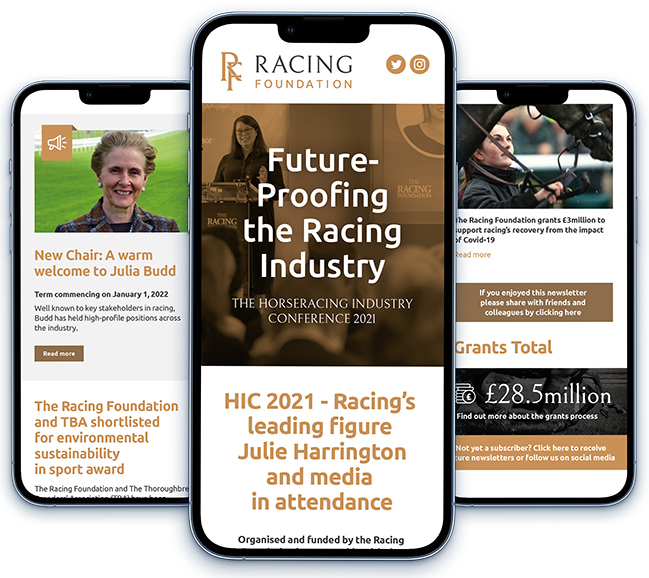


16 Nov 2022
16th November 2022: The Racing Foundation has awarded the Horse Welfare Board a grant of £3million over three years to support its cross-industry work to improve equine welfare in British racing.
The grant will be used to deliver the horse welfare projects identified in the industry’s A Life Well-lived Strategy – a five-year plan to ensure the highest standards of welfare for all horses bred for British racing.
Released in stages over the next three years, the funding will cover multiple projects to drive forward important developments in safety, data, and traceability along with supporting programme and executive team costs.
The expected outcomes of the grant are:
17 Horse Welfare Board projects are now live with in-depth cross-industry work underway covering: obstacle improvement and development, ground and going, stalls and starting processes, development of the Jump Racing Risk Model, analysis of fatalities and injuries occurring off the racecourse, traceability, development of the welfare funding model, analysis of medication and clinical records, creation of a welfare data unit and ongoing communications around the sport’s work and progress.
Obstacle improvement and development and the advancement of the sport’s Jump Racing Risk Model (JRRM) are two of the Horse Welfare Board’s key safety projects for the first year of the grant. With support from external epidemiology experts, the JRRM will become a one-stop-shop for data on racehorse falls to identify trends and help drive forward the sport’s risk management actions.
Programme Director Helena Flynn, Equine Safety Advisor Mike Etherington-Smith, Welfare Data Projects Lead Stephen Wensley, Aftercare Project Lead Francesca Compostella and Programme Manager Jessica Farr comprise the Horse Welfare Board project team tasked with delivering the projects. All initiatives led by the team are being developed collaboratively using the help of experts from across the industry as part of the sport’s collective commitment to horse welfare.
The team, which was formed in May 2021, has already driven positive change with the implementation of the Orange to White Project, which has seen racecourses across Britain change the colour of their take off boards and markers following a study on equine vision funded by the Racing Foundation and conducted by the University of Exeter in 2017.
Rob Hezel, Chief Executive Officer at the Racing Foundation, said: “It is crucial that British racing’s equine athletes and all horses bred to race receive the highest standards of welfare.
“The Foundation is delighted to have been able to provide 50 per cent of the costs for delivering the Horse Welfare Board’s strategy, A Life Well Lived, amounting to £3million through to 2025, by which time all the projects included in the strategy are due to be completed.
“The Racing Foundation Trustees acknowledge that equine welfare will continue to require management beyond 2025 and are committed to work with industry colleagues to help identify sustainable funding sources for the work beyond that point.”
Chair of the Horse Welfare Board, Barry Johnson commented: “We are incredibly grateful to the Racing Foundation for the grant award of £3m over the next three years and applaud their focus on, and investment in, welfare within British racing.
“The Horse Welfare Board’s comprehensive strategy will help move the sport’s already well-established welfare standards to new levels of excellence.”
Helena Flynn, Horse Welfare Board Programme Director added: “Since the formation of the team last year, detailed work has been carried out to scope, prioritise, and cost the core initiatives from the Life Well Lived Strategy.
“To date we have delivered the implementation of the equine vision project, have redefined racing’s responsibility to thoroughbreds at their first step out of racing and have laid the groundwork for critical data projects. We now have 17 projects live and with the Racing Foundation’s core funding secured we can progress at speed.”
ENDS
Notes to editors:
Equine Vision Project: Research with Exeter University was funded by the Racing Foundation and implementation of the change from orange to white across British racecourses was funded by the Horserace Betting Levy Board.
The Horse Welfare Board also receives funding support from the Horserace Betting Levy Board (HBLB). Since 2019 the HBLB has invested over £1million in welfare-related initiatives, including supporting the roll-out of the Orange to White Equine Vision project during 2022.
For further information, please contact:
Horse Welfare Board & Great British Racing
Gabi Whitfield
Head of Welfare Communications
[email protected]
Racing Foundation
Rhi Lee-Jones
Head of Communications and Events
About the Racing Foundation: In 2012 the Racing Foundation was established to oversee the distribution of funds to charitable causes within the racing and thoroughbred industry following the sale of the Tote. Since inception it has awarded over £35million in grants. People, equine welfare, community engagement and environment and emerging issues are the key areas of focus in The Trustees of the Racing Foundation are Julia Budd (Chair), Linda Bowles, Susannah Gill, Mark Johnston, Louise Kemble, Alice Page and Algy Smith-Maxwell. The British Horseracing Authority, the Horsemen’s Group and Racecourse Association are the three joint Members of the Racing Foundation, which is registered with the Charity Commission as a charity under the law of England and Wales (no. 1145297).
About the Horse Welfare Board: British racing’s goal has always been to lead the way in setting the best welfare standards in the world, both on and off the racecourse. The independently chaired Horse Welfare Board was established in 2019 and is responsible for overseeing the single overarching strategy for equine welfare in the racing industry. The five-year strategy, “A life well lived”, was launched in February 2020 and considers the whole of the racing industry, including sectors not currently fully regulated by the British Horseracing Authority (BHA) and looks across the lifetimes of all horses bred for racing. Multiple workstreams are underway covering projects ranging from traceability, training, obstacle improvement and development, through to welfare funding.